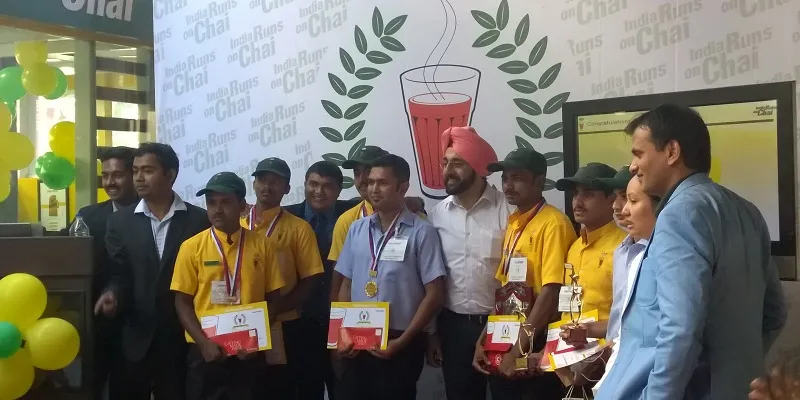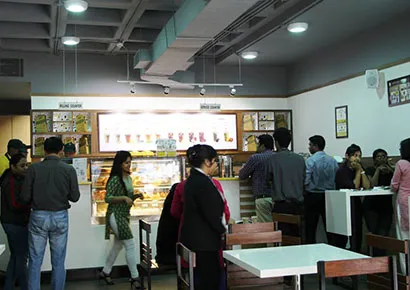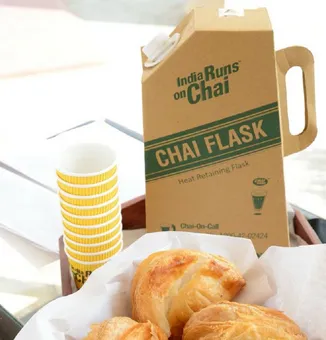Brewing a brand from tea – the Chai Point story
“What we’re trying to do is to create a brand around chai. There’s a lot of money in building coffee chains, but fundamentally the numbers show that the consumption of chai is at least 10 times that of the consumption of coffee,” says Sandesh C, chief operating officer at Chai Point. “Chai is such a pragmatic market that you can get chai anywhere, which is a level of convenience you already have. We’re the only branded entity trying to create an impact without even innovating on the product. Chai as a beverage has been consumed by many, and will be the beverage of choice for many more,” he adds.

Chai Point’s slogan, ‘India runs on Chai’, is clearly on the money with an estimated 911 million kilograms of chai consumed in 2013 – 2014 (source link). Chai Point, led by CEO Amuleek Singh, currently serves chai in Bangalore and the NCR region through their 60+ stores and Chai on Call delivery service. They recently conducted the third edition of the event called Chai Masters at their MG Road branch in Bangalore.
Chai masters
“We have more than 300 employees in our system out of which 70-80 actually make the chai, while the rest are store managers, delivery boys, service staff etc. At Chai Masters we’ve called some great judges who help us pick the top three chai brewers from our own staff across the 60 stores. Apart from this we also have evaluations for other roles such as store managers and delivery boys,” explains Amuleek. The winners of the event are awarded shields, medals and certificates, presented by the CEO. The event is also used as an opportunity to showcase new technology and products developed by Chai Point.
Chai @ work
Chai @ Work, a large part of Chai Point’s business, is a service where they cater directly to more than 50 large corporate firms and many more medium and small sized firms. Larger corporate offices and business parks are serviced by mini-stores and stores on the premises, while the smaller firms are catered to by either large dispensers of chai or their smaller heat-retaining disposable flasks. Offices can even subscribe for regular deliveries using the Chai Point app. The deliveries are carried out by 100 per cent electric bikes.

The heat-retaining flasks come in two sizes, the one litre and the half-litre pack. “The main tech behind the flask is the pouch, which retains the heat. It has been sourced from the pharmaceutical industry where it’s potentially used for storing blood plasma, so we asked them for pouches of food grade material and of the right thickness so the chai stays hot for about an hour,” reveals Amuleek.
In-Store
“Chai as a product is very simple. We don’t sell 30-40 varieties of chai. If you look up at our menu you’ll see we have about six varieties of hot chai and five varieties of cold chai, and the volume comes from them. People want to have a simple masala chai, ginger chai or lemon chai. We’ve kept it very simple on the product side,” explains Sandesh. As Chai Point looks to expand in other cities such as Pune, Hyderabad and Chennai, they wonder if they need to tamper with their core: Dum chai, Ginger chai, Masala chai and Lemon chai. “We took the same recipes to Delhi and they’ve worked beautifully. When it comes to varieties Hyderabad has its Sulaimani chai which is basically a lemon chai variant. I think our core four can cover the requirements of any region. What we may have to play around with are the levels of masala or ginger in a glass. I doubt we’ll have to re-engineer the menus for each region,” says Sandesh. “However, we will keep working on innovative items like the Masala Chai Latte,” he adds.
A big challenge of managing of 60+ stores across two regions, with expansion in three more cities on the map, is maintaining consistency in taste, quality and service. “You have to scale a quality glass of chai, and a lot of hard work goes doing that. That’s what the core of Chai Masters is. We have judges to figure out why the taste may vary and to keep a track of acceptable levels of variations,” mentions Amuleek. Apart from maintaining the same recipe across stores and training each brewer the same way, the ingredients need to be the same to maintain consistency. “The central ingredient is tea, and we have control over that ingredient. We have one single supplier for Bangalore and Delhi, we make our own blend, we have quality control checks in place and we have a tea advisory board which approves the blend. The same blend is shipped to Delhi and Bangalore, and will be shipped to all other locations once we get there,” explains Yaduvir Singh, head of supply chain at Chai Point. “The milk is sourced from the same dairy company in both cities. We get customized packs of sugar from one supplier which is then shipped to every store. Our entire supply chain system is highly centralized so we can maintain control over all the ingredients,” adds Yaduvir.

The company has built its own cloud-based software platform called Shark which connects the point of sale, supply chain, employee management, delivery system, auditing etc. in one place. “We sell about 70,000 glasses of chai a day, and we believe we can make it 700,000. To reach that kind of scale you’re going to need a world class IT system to be able to really monetize on the transactions. We have 7,000 customers using the prepaid card on mobile and roughly 23,000 customers using the physical prepaid cards. This means that we can collate the consumption patterns for close to 30,000 customers a day. Our ability to use this insight can really help improve our service and operational efficiency,” explains Amuleek.
The interiors of each store have been designed to be modern and functional with limited comfort, just as one expects from a quick service restaurant. “All our stores are built around the fact that the customer wants a fast and quick experience with great chai. We understand that working people have about 15 minutes, so we have standing tables that allow for quick conversation,” explains Sandesh. On the other hand, however, the store at Cunningham Road in Bangalore sports a touch of luxury. “Whenever we get the opportunity, we are going to play around with the store format to get a sense of what works depending on the neighborhood. The store design needs to keep evolving,” he adds.
“Choosing real estate is really important. All the cities that we have targeted are work hubs in their respective regions, like Noida, Gurgaon, Bangalore, Pune, Hyderbad, etc. The approach that we go with when we move into a new city is that we should be able to simultaneously open five stores in areas of high white collar worker concentration,” reveals Amuleek. For a store in a corporate hub, the math around how much chai could sell is easier to crack as compared to calculating the potential sales for a store on a street location. “We have to identify anchor points like offices, schools and colleges, hospitals, bus terminals, etc. Along with that we need to identify the other options customers will have for a freshly brewed cup of chai; to get a sense of the competition and potential crowd,” explains Sandesh.



